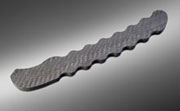Sainsbury Utilizes RPC Blackburn's Transparent PET Bottles for Storing Food Extracts

Sainsbury's has launched the latest additions to its successful Taste the Difference range premium flavourings in a custom 43.5ml PET bottle manufactured at RPC Containers Blackburn. The bottle, produced for Food Innovation, is being used for a new range of premium food extracts for home baking and flavoring. Its impressive clear appearance highlights the vibrant colours of the contents. PET combines ease of use with safety it is lightweight and shatterproof, making it ideal for use in the kitchen. Kevin Rushton, Senior Partner at Food Innovation, added "The excellent clarity of the bottle means these high-quality extracts are clearly identifiable on the shelf." "We know there's a growing market for home baking products such as these, and consumers who buy the range are looking for quality. It was important, therefore, that the packaging from RPC matched that ethos." Sainsbury's are the first to market with an own-label home baking
